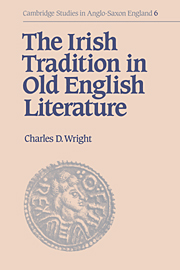Book contents
- Frontmatter
- Contents
- Acknowledgements
- List of abbreviations
- 1 Introduction
- 2 The ‘enumerative style’ in Ireland and Anglo-Saxon England
- 3 The Visio S. Pauli and the Insular vision of hell
- 4 Apocryphal cosmology and Celtic myth in ‘The Devil's Account of the Next World’
- 5 The literary milieu of Vercelli IX and the Irish tradition in Old English literature
- Appendix: Vercelli Homily IX and ‘The Devil's Account of the Next World’
- Bibliography
- Index
- Frontmatter
- Contents
- Acknowledgements
- List of abbreviations
- 1 Introduction
- 2 The ‘enumerative style’ in Ireland and Anglo-Saxon England
- 3 The Visio S. Pauli and the Insular vision of hell
- 4 Apocryphal cosmology and Celtic myth in ‘The Devil's Account of the Next World’
- 5 The literary milieu of Vercelli IX and the Irish tradition in Old English literature
- Appendix: Vercelli Homily IX and ‘The Devil's Account of the Next World’
- Bibliography
- Index
Summary
A pivotal fact in the ecclesiastical history of the English nation, according to Bede, was that the Irish monks and missionaries who came to England during the first century of the conversion had certain distinctive customs that attracted the attention, and disapproval, of their counterparts who had been dispatched from Rome. Irish irregularities (from the point of view of the Romanists) in the calculation of Easter, the form of tonsure and the ordination of bishops were the focus of dissension, but the Irish were distinctive in other ways, notably in their rigorously ascetic devotional practices. Inevitably, Irish forms of devotional expression were adopted by English ecclesiastics educated in the Irish tradition. Cuthbert, for example, was an Anglo-Saxon bishop whose way of life bore a distinctively Celtic impress. It is natural to suppose that Irish Christian literature of the early Middle Ages would have reflected characteristic emphases of Irish learning and spirituality, and that Irish literary traditions would also have been assimilated by English authors trained in Irish schools or exposed to Irish books. Certainly, the potential for such influence existed, for the Irish played a formative role in the Christianization of the pagan Anglo-Saxons – as Bede often warmly acknowledges – and scholars no longer assume that Irish cultural influence in England evaporated after the Synod of Whitby. David Dumville has spoken of Historical circumstances, then, were clearly favourable for literary relations between Ireland and England; but it has proved difficult to define precisely how Irish Christianity and literature did influence Anglo-Saxon writers.
- Type
- Chapter
- Information
- The Irish Tradition in Old English Literature , pp. 1 - 48Publisher: Cambridge University PressPrint publication year: 1993

